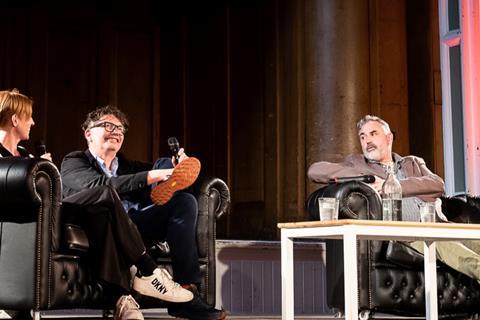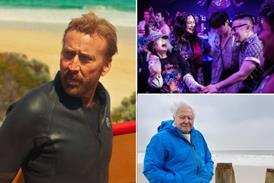
The sequel to 28 Years Later begins production today as producer Andrew Macdonald and writer Alex Garland talked about what will hopefully be a trilogy and their enduring partnership during an on-stage talk at the Edinburgh International Film Festival (EIFF) on Sunday, August 18.
“The first one [in the trilogy] is 28 Years Later, Alex has written them both [28 Years Later and its sequel], Danny directed [28 Years Later and] has finished shooting,” said Macdonald, who is also chair of EIFF. “We’re just about to start tomorrow morning [August 19] part two, directed by Nia DaCosta, and we hope there is going to be a third part. There is a trilogy.”
They follow Danny Boyle’s 28 Days Later in 2002, and Juan Carlos Fresnadillo’s 28 Weeks Later in 2007.
Macdonald has produced all of the films in the UK post-apocalyptic film series through DNA Films. Garland and Boyle stepped back from writer and director duties for 28 Weeks Later, but remained executive producers.
Garland and Trainspotting producer Macdonald spoke extensively about their long-standing working and personal relationship. Their collaboration began with Macdonald producing Boyle’s adaptation of Garland’s novel The Beach in 2000, starring Leonardo DiCaprio.
Macdonald then talked Garland into writing the 28 Days Later script by taking him for a dinner at Pizza Express.
Garland reflected on the difficulty of getting 28 Days Later made: “Sometimes the most difficult films turn out to be really good. 28 Days Later was incredibly difficult – we ran out of money. We didn’t have an ending, we shot another ending, we edited for eight months.”
The pair also opened up about the projects that they didn’t feel turned out so well, such as 2010 film Never Let Me Go, starring Keira Knightley, Carey Mulligan and Andrew Garfield. Garland adapted Kazuo Ishiguro’s novel, with Macdonald producing and Mark Romanek directing.
“I thought it was okay,” said Garland. “I learnt a lot from it. You always learn something…. The problem it had, which is nothing to do with the source material which is very brilliant, [was that] the film very brilliantly hit a particular note perfectly but then it didn’t really vary in that note, if I was being tough about it. It’s a good film in some ways, but flawed in that respect.”
Garland explained he used this experience when working on what he feels was the easiest film to make of his career, his directorial debut, 2014 sci-fi thriller Ex Machina, starring Alicia Vikandar, Oscar Isaac and Domhnall Gleeson.
“The reason that disco dancing scene is [in Ex Machina] is because of Never Let Me Go,” he explained, referring to a scene involving Oscar Isaac throwing some shapes. “I thought I should seek to disrupt the tone. It turned out to be a GIF.”
While today the film’s stars are recognisable names, Macdonald recalls that wasn’t the case back in 2014. “From a producing point of view, the thing that made that film so great is we cast the right actors. [However] the right actors, if we made it independently, didn’t carry enough weight to raise the money through international sales. We decided to make the film with Universal International,” he explained. At the time, Universal had films in the works with Vikandar and Isaac that gave it confidence in their appeal.
“The sales companies wanted us to cast Jake Gyllenhaal,” Macdonald continued, “and that would have changed the whole film, because he was bankable, he could sell foreign territories. I remember having a conversation with Jake Gyllenhaal’s lawyer about ‘Jake’s needs’. It was never going to work.”
On deciding to move from writing into directing, Garland admitted: “I never wanted to be a director – I wanted to stop directors changing things. The only way I could do that was by occupying that position.”
He clarified, “I enjoyed Ex Machina very much, and I enjoyed a TV show called Devs very much… Broadly no – I don’t really enjoy it. There are many directors, Danny [Boyle] is one of them, Danny is happiest on set. He loves being on set. He loves doing it. I made a decision to stop directing for a while which I’ve stuck to so far and write scripts for other people.”
His most recent directorial foray, A24-backed SXSW premiere Civil War, is a dystopian thriller that follows a photojournalist, played by Kirsten Dunst, faced with chronicling the horrors of a US civil war.
“The film came from anger and contempt,” said Garland. “I remember just before it came out thinking this film is kind of like walking into a bar and shoving all the drinks off the counter and going ‘Fucking come on, twat’. It was globally aggressive – it didn’t matter where you were.”
Garland reacted to online criticism that he didn’t pick a decisive enough political stance in the film by stating: “That was just bollocks. What that meant was I didn’t pick their side. I’m a centrist. Politically I’m a left-wing centrist.
“The idea that centrism isn’t a political position is idiotic. It is a political position against extremism, specifically against the extreme right, I would say. That’s the greatest danger democracies tend to encounter.”
He paused: “The problem is everything I say here might get put on Elon Musk’s ultra right-wing broadcast platform. It might get spread and X’d or whatever the term is. You have to watch what you say – that’s why I chose to speak via a film. There’s anger in it but there’s precision. I don’t want to screw that up by talking too much.”
On the personal side of having worked with Macdonald for so long, Garland admitted: “We have huge fucking rows and fallouts… We wanted to kill each other at times. I care about Andrew very much, we’ve worked together for a very long time. There are so few people who can do the thing Andrew does. We talk far too much about directors, like far too much. We don’t talk enough about producers.”



































No comments yet